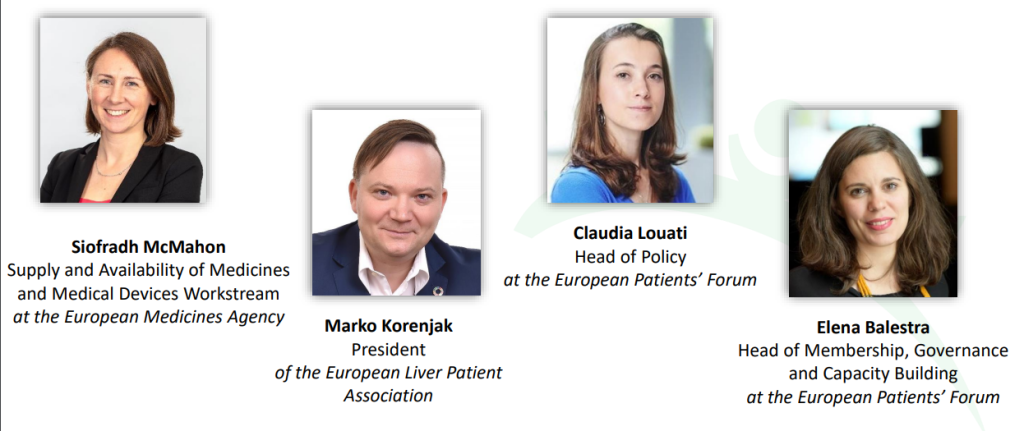The New EMA Mandate
On 23 June European Patient Forum (EPF) held a webinar on shortages of medicinal products.
Elena Balestra, Head of Membership, Governance and Capacity Building at the European Patients’ Forum, welcomed all attendees and opened the webinar.
Claudia Louati, Head of Policy at the European Patients’ Forum held a brief introduction on shortages, explaining what it means. ‘A shortage of a medicinal product for human or veterinary use occurs when supply does not meet demand at a national level’. Until a few years ago there was no real unified definition of shortages in the EU. It has been an increased amount of medicine shortages the last few years, and some countries in the EU have been more affected than others.
A study on shortages was done a few years ago. It is very hard to pinpoint the direct cause and often the causes are multifactorial. Often the cause can be traced back to lack of quality and manufacturing. Outsourcing of production to far away countries, and price policies have also had an impact on shortages. In addition, there is an increase in demand.
Regulatory authorities both within and outside Europe are increasingly working together to prevent shortages and to limit their impact whenever they occur.
Siofradh McMahon, Supply and Availability of Medicines and Medical Devices Workstream at the European Medicines Agency (EMA).
EMA is a decentralised agency of the European Union (EU) responsible for the scientific evaluation, supervision and safety monitoring of medicines in the EU. Their mandate includes:
- Review of new medicines to determine whether they are safe, efficacious, and of high quality before they can be authorized for sale in the EU
- Continuous work on, and monitoring of, safety, efficacy, and quality of existing authorized medicines Authorization of a product by EMA allows a manufacturer to access the market in each EU/EEA country
The individual healthcare systems implement this separately in each country, according to local needs.
EMA works very closely with Marketing Authorisation Holders, European Commission and other institutions like WHO (World Health Organisation), National Competent Authorities, Ministries of Health, Pharmacists, Distributers, Patient Organisations on behalf of patients and all stakeholders that are involved. In addition EMA works worldwide with global regulators to share best practices and to understand the situation on a global level and how the situation can be best managed in Europe.
The aim is to pinpoint and reduce or eliminate the gap between supply and demand.
In the link you can find more information on the work of EMA https://www.ema.europa.eu/en .
In the link below, you can explore public information on medicine shortages specifically within the EU and EEA member countries.
Agendas and meeting summaries from some of the work EMA does is also available on their website.
One of the key aims of the new EMA mandate is to bring everybody closer together where the member states have visibility to their neighboring states and that all EU member states have joint meetings typically every month.
Regulation (EU) 2022/123 and shortage This regulation formalises some of the structures and processes EMA set up in the COVID-19 pandemic and assigns new tasks to EMA in the following areas: Monitoring and mitigating potential or actual shortages of critical medicinal products, medical devices and in-vitro diagnostics Providing scientific support to the development of high quality, safe, and effective medicines during public health emergencies Ensuring the smooth functioning of expert panels to assess high-risk medical devices and advise on crisis preparation and management
Link to the EU Regulation 2022/123:
https://eur-lex.europa.eu/legal-content/EN/TXT/?uri=CELEX%3A32022R0123
Marko Karenjak, President European Liver Patient Association, Member of PCWP at EMA representing liver patients and member of PRAC.
Marko is a patient advocate and spoke about how we can further enhance the voice of the patients regarding medicines that are taken off the market or not available.
A strong patient voice can show where the shortage still is, even if the government representatives says that the problem is solved. To engage on a national level and make changes as patient representatives, Marko emphasized that you need to be in touch with national regulatory representatives and the ministry of health, so you have a close relationship with the stakeholders which are the official representatives in your country. It is important to monitor and engage in the implementation of the new EMA mandate, and as member of PRAC and co-chair of PCWP, Marko attends meetings within EMA and make sure that the patient voice is heard.
Merete Avery, Operations Manager, Dystonia Europe

